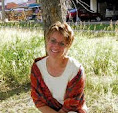A world away
I See the Sun in Afghanistan by Dedie King (958.1 KiI
2011 PIC BK)is one in a series of books that looks to present a glimpse into
the lives of children living in different parts of the world.
For a young girl living in Bamiyan, Afghanistan, daily
activities include waking up very early to fetch water from a well located a
short distance from her house, going to school in the morning, and doing chores
in the afternoon. Habiba appreciates the
beauty of her home, the smells from her mother’s kitchen and presence of her
family. The importance of family and
helping one another is demonstrated when Habiba’s family opens their home to an
uncle, a soldier, who was has lost his legs and a set of homeless cousins, aunt
and uncle, as a result of the war. Habiba
does wonder how it will turn out, “how can so many people live together in our
small house?” But it is accepted and
life goes on as a meal is shared and everyone settles in for the night.
There is a gentleness in this story which is a little
unexpected. With the many horrible
stories we hear about Afghanistan in the news, this one is about the everyday
flow of life. There is an author’s note
at the end of the book that explains that Bamiyan is one the more peaceful and
safe areas in this fraught country. The
illustrations by Judith Inglese also contribute to the calm quality of life for
Habiba’s family. She uses a mix of media, photographs and pencil drawings which creates softness to the illustrations.
The book is written in both English and Dari and a glossary
will help children with some of the unfamiliar Dari words incorporated in to
the story.
I liked the story and the illustrations. I liked that this wasn’t about the war and
the political turmoil that mires down this country.
But – I wonder about the authenticity of the voice in this story. This is not written by an Afghan but by an
American author who was a Peace Corps volunteer in Nepal in the 1960s. She may
be familiar with this area and certainly feel she has an understanding of the
culture but I wonder what an Afghan would think. Are the values accurately portrayed? Culture is finely nuanced and I wonder what
has been missed. I don’t know enough to
know what isn’t right or if anything is misrepresented.
I will recommend this book, however and suggest it for
students in grades 1 to 5 because learning about life in other parts of the world can be a
way to look more closely at the way North Americans live.














2 comments:
Tammy, thank you for your thoughtful review. As the publisher of the "I See the Sun" series, I want to assure you that not only did people living in Afghanistan today read the story before it was published, but the translator is an Afghan native, currently a grad student in the US. Of course, there are subtle nuances of daily life in any locale. However, our intention with this series is to provide an introduction to a variety of cultures and languages that will foster curiosity and acceptance of our differences, while recognizing what we all share.
Thanks for providing some background on the people involved with writing and producing this book and others in the series. I appreciate knowing such care was taken to accurately portray Afghan culture.
Thanks again for taking the time to drop me a line.
Tammy
Post a Comment